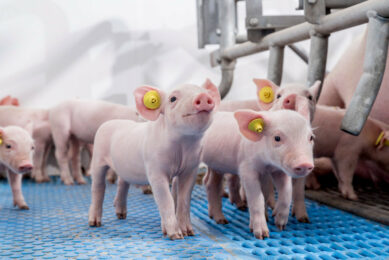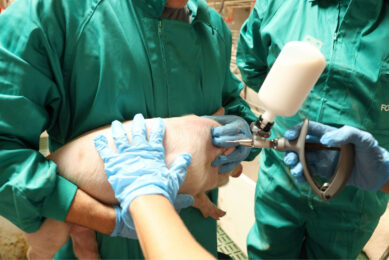RESEARCH: Boar taint vaccination affecting pig prices

Vaccinating against boar taint was shown to have a negative impact on pig prices paid by meatpackers in Germany.
This was concluded by the agricultural chamber of the state North Rhine Westphalia, on the basis of research carried out at the well-known research centre Haus Düsse.
For the research, five groups of boars were set up, each containing 35-40 boars. Four groups were vaccinated with Improvac, by Zoetis Animal Health. One group served as a control group and was not vaccinated nor castrated. In the four vaccinated groups, there was variation in the moment of vaccination (four or six weeks prior to slaughter), nutrition (high or restricted in proteins) as well as feeding strategy (ad lib or restricted in late finishing). The pigs were crossbreeds of the Topigs-20 sow and a Piétrain. Slaughterweight was 120 kg.
When treating animals with Improvac, vaccination occurs on two moments. The first moment is usually given at eight weeks of age; the second should be given four to six weeks prior to slaughter. Main aim is to have boars growing fast like normal boars – and curb their development of the testes by the second vaccination.
In the research, the vaccine indeed proved to have a positive effect on feed conversion and pig growth. Its goal of reducing boar taint-related compounds like androstenone, skatole and indole was also successful – they were reduced by about 90%. The pig price, however, did not compensate for the purchase of the vaccine. At the end, the use of the vaccine/pig cost between €7 and €15, depending on the group.
The carcasses were observed to have more backfat than in untreated animals. This backfat increased as soon in the group that had the second vaccination at six weeks prior to slaughter – the other three had it at four weeks.
In the control group boars, the hams, shoulders, cutlets and belly proved to be heavier than in vaccinated animals. In additoin, the bellies in the control group proved to be dry. This all caused that a quotation of €1.70/ kg slaughterweight, a control boar yielded between €6.30 and €13.90 more than a vaccinated animal at German meatpacker Westfleisch.
At meatpacker Tönnies, one other giant on the German market, the differences were between €7.70 and €14.50 per pig in favour of the control animals.
Feed costs for vaccinated boars were lower, up to almost €3, depending on the group.
The research was published last week in Wochenblatt, a magazine for agriculture in North Rhine Westphalia.
Response from Zoetis
A spokesperson for Zoetis said that the trial results are not in line with previous experience with Improvac in commercial use when compared to entire boars, and this may be a result of the way in which the study was conducted. In the commercial setting the major benefits of Improvac use compared to non-vaccinated boars are improvements in pork eating quality, a reduction in carcass down grading because of boar taint, and the easier management of pigs in late fattening due to a reduction in male sexual and aggressive behaviour – none of these parameters were taken into consideration in the present study.











